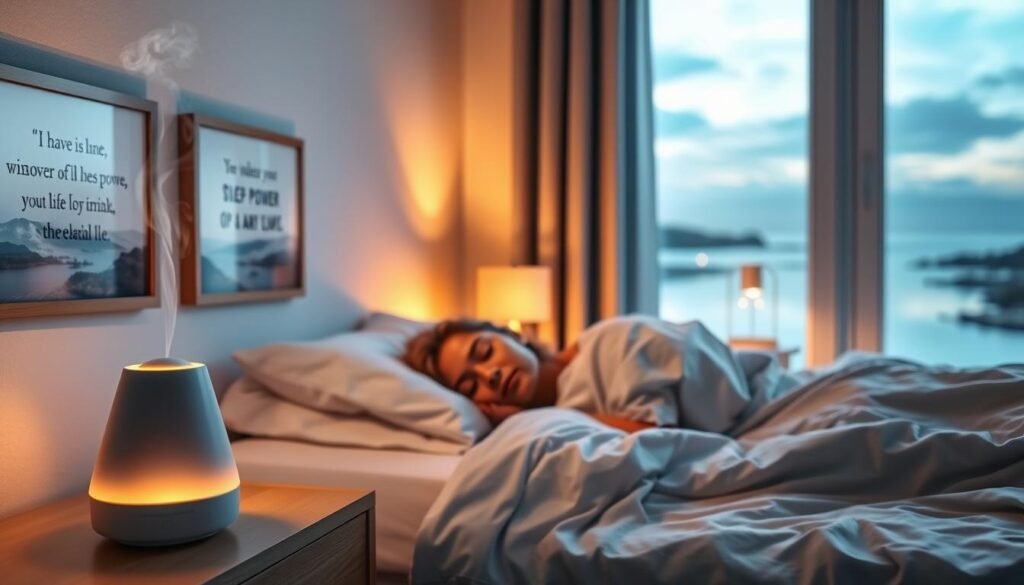Ever spent the night wide awake, troubled by endless thoughts and worries about tomorrow? You’re not alone. About 30% of adults suffer from sleep anxiety sometime. This article shares her journey to beat sleep anxiety, revealing helpful methods and experiences. She details natural ways and tips to ease sleep anxiety, aiming to help you enjoy restful nights again. Through behavior changes and lifestyle adjustments, she shows you can improve your sleep and health. Learn more about tackling anxiety and insomnia for better sleep here.
Key Takeaways
- Sleep anxiety affects about 30% of adults, contributing to insomnia and panic before bedtime.
- Effective techniques such as Cognitive Behavioral Therapy can improve sleep in over 70% of chronic insomnia patients.
- Mindfulness practices can reduce anxiety symptoms by up to 58%, aiding restful sleep.
- Maintaining consistent sleep schedules can enhance sleep quality by up to 40%.
- Lifestyle choices, including diet and exercise, play a crucial role in managing sleep anxiety.
Understanding Sleep Anxiety and Its Symptoms
Many people struggle with sleep anxiety, worrying too much about falling or staying asleep. This problem shows itself in many ways and makes sleeping even harder. Knowing about sleep anxiety is key to finding out its symptoms and how to treat them.
What Is Sleep Anxiety?
Sleep anxiety is when you’re really scared or worried about going to bed. It makes it hard to fall asleep, stay asleep, or get good rest. You might keep thinking you’ll have insomnia or wake up a lot, which makes the worry even worse. This fear of not sleeping well means understanding sleep anxiety is important for dealing with it.
Common Signs of Sleep Anxiety
It’s important to know the signs of sleep anxiety to get the right help. Look out for these common symptoms:
- Racing thoughts before bedtime
- Physical tension and restlessness
- Feelings of dread or panic when thinking about sleep
- Difficulty in falling asleep or frequent awakenings
- Daytime fatigue due to inadequate sleep
People with these symptoms may notice they get worse when stressed, leading to more sleep problems.
How Sleep Anxiety Differs from Insomnia
Insomnia is about not being able to sleep, but sleep anxiety includes worry. Insomniacs might not sleep well without feeling anxious, but if you have sleep anxiety, you’re afraid of the effects of bad sleep. Knowing this difference helps choose the best treatment. For example, therapy like CBT-I works well for both conditions.
Identifying the Triggers of My Sleep Anxiety
It’s key to know what causes sleep anxiety to handle it well. By figuring out what triggers it, people can tackle these stressors. Things like personal experiences, where you are, and how you live can impact sleep.
Personal Experiences with Anxiety Triggers
For many, sleep anxiety comes from personal issues like job stress or big life changes. These can boost anxiety, making calm sleep hard. Knowing these triggers helps create better coping methods.
Environmental Factors Affecting Sleep
Where you sleep hugely affects sleep quality. Bad bedroom conditions, like too much noise or bad lighting, lead to tossing and turning. It’s crucial to identify and fix these issues for better sleep.
The Role of Lifestyle Choices
Your daily habits play a part in sleep anxiety. Actions, such as drinking too much caffeine or sleeping at random times, can make anxiety worse. Looking at and changing these habits—like cutting back on caffeine—helps improve sleep and overall health.
The Importance of a Healthy Sleep Routine
Having a good sleep routine is key to managing sleep anxiety. By sticking to a regular plan, you can sleep better overall. Making a sleep schedule that fits your life ensures you get enough rest each night.
Creating a Sleep Schedule
Creating a sleep schedule means sleeping and waking up at the same times every day. Doing this sets your body’s clock, making it easier to sleep and wake naturally. Keeping a regular schedule makes your sleep better and leaves you feeling refreshed each morning.
Benefits of a Relaxing Bedtime Ritual
Adding a relaxing bedtime ritual helps with sleep anxiety. Doing calm activities like reading or stretching tells your body it’s time to relax. This helps you fall asleep easier, creating a peaceful environment for rest.
Limiting Screen Time Before Bed
Cutting down on screen time at night is vital for good sleep. The blue light from screens can mess with your melatonin, making sleep harder. Less screen light in the evening boosts melatonin and improves sleep.
Techniques I Used to Manage Anxiety
There are many ways to help people handle sleep anxiety effectively. These methods work by creating a calm state that leads to better sleep. Using mindfulness meditation, breathing exercises, and journaling has been helpful. They lower stress and make you feel better overall.
Mindfulness Meditation Practice
Mindfulness meditation brings peace, quieting the mind. It changes negative thoughts that cause anxiety. Doing it for 10-15 minutes before bed helps a lot. It lets your mind relax and you sleep better.
About 70% of people with anxiety have trouble sleeping. Mindfulness regularly can help fix this issue.
Breathing Exercises That Helped
Deep breathing is a strong way to relax. It can slow your heart rate and cut anxiety by up to 30%. Doing deep breathing before bed gets your body ready to sleep. Just five minutes of it can lower anxiety and aid in better sleep.
Journaling for Clarity
Journaling at night helps work through the day’s stress. It lets you let go of thoughts that stop you from sleeping. This not only organizes your thoughts but also eases sleep anxiety. Setting aside time to worry has cut anxiety by 25%. It makes falling asleep easier.
The Role of Exercise in My Sleep Journey
Exercise has become a big part of solving sleep problems. It plays a huge role in improving sleep and mental health. The right kind of exercise can help reduce sleep anxiety. This makes it easier to relax. Exercises like yoga, running, or lifting weights can boost energy and calmness.
Finding the Right Type of Exercise
Moderate aerobic exercises are really good for better sleep. People who exercise regularly tend to fight off insomnia better. They can fall asleep quicker and sleep longer. For example, just a few weeks of moderate exercise can make you fall asleep 13 minutes faster. And you might sleep 18 minutes longer. Choosing the right exercise is important because not all exercises are the same in benefits.
How Regular Activity Improved My Sleep
Being active regularly affects sleep for people of all ages. Exercise can work as well as medicine for some with insomnia. It not only improves sleep quality but also cuts down anxiety before sleep. Starting a simple exercise routine can quickly improve your mood and lower stress. Both are good for sleep. Over time, exercising regularly can fight off depression, helping you sleep better.
The Best Time to Work Out for Sleep
The timing of your workout is key to getting better sleep. Exercising earlier in the day is best for sleep. Working out too close to bedtime might keep you awake. It’s wise not to exercise at least two hours before bed. This helps you avoid any sleep troubles. Planning workouts with your body clock in mind helps manage sleep problems better. Learn more about beating insomnia with cognitive behavioral therapy for insomnia.
The Impact of Nutrition on Sleep Anxiety
Nutrition is key in handling sleep anxiety. Some foods have qualities that can lower anxiety and boost sleep quality. Adding certain foods to your diet can improve sleep and lessen anxiety.
Foods That Help Calm Anxiety
Foods to calm anxiety include magnesium-rich ones like leafy greens, nuts, and seeds. Eating foods high in melatonin, such as cherries and kiwis, helps sleep by upping melatonin. Foods like whole grains, which are complex carbs, can also help by raising serotonin levels, which has a calming effect.
Studies have found that following diets like the Mediterranean or DASH diet can enhance sleep quality and reduce insomnia.
The Importance of Staying Hydrated
Hydration and sleep are closely connected. Even being a little dehydrated can worsen mood and increase anxiety. It’s key to keep drinking water all day for better mental health.
Research links staying well-hydrated to improved mental health. Drinking enough water supports good brain function and mood.
Caffeine and Alcohol Effects
Cutting down on caffeine and alcohol is crucial for sleep anxiety management. Caffeine, especially before bed, can cut down on sleep time and make you jittery. While alcohol might seem helpful at first, it can disrupt sleep and leave you feeling uneasy.
Less caffeine and alcohol, especially at night, can improve sleep quality and reduce anxiety.

Changing what you eat can help with sleep habits, alongside other anxiety treatments. Knowing how nutrition for sleep anxiety affects health can greatly improve managing anxiety and getting good sleep.
Seeking Professional Help
Sometimes, self-help isn’t enough for sleep anxiety. If it starts affecting your everyday life, getting therapy is key. Professionals can offer the right solutions for you.
When to Consider Therapy
If your sleep is often bad, it might be time for therapy. You might have trouble falling asleep, wake up a lot, or always feel tired. This means simple strategies aren’t working.
Types of Therapies for Sleep Anxiety
Cognitive-behavioral therapy (CBT) really helps with sleep anxiety. It changes negative thoughts that mess with sleep. Other methods like mindfulness and relaxation also work well. Sleep restriction therapy (SRT) is good for cutting down awake time in bed, improving sleep.
Finding the Right Mental Health Professional
Finding the right expert is crucial for handling sleep anxiety. Look for licensed therapists, psychologists, or sleep specialists. Online therapy options connect you with a pro within 48 hours. Check if your insurance covers the therapist to ease money worries.
Success Stories from Others
Sharing success stories can really help those facing sleep anxiety. They show that many ways can lead to overcoming sleep issues. Some people changed their sleep habits. Others found strength in community support. Their stories stress the importance of learning from one another.
Real-Life Remedies That Work
Many people have beaten sleep anxiety with different methods. These include:
- Mindfulness practices for better relaxation.
- Regular exercise to improve well-being.
- Behavioral interventions for better sleep.
- Exposure therapy turning anxiety into positive times.
Community Support and Shared Experiences
Community support greatly aids anxiety relief. Joining forums or groups allows for sharing and learning. It offers crucial motivation. Feeling connected helps battle the loneliness that sleep disorders foster.
Learning from Others’ Journeys
Learning from others offers new ways to manage sleep problems. Hearing how people overcame sleep anxiety can inspire. It shows that recovery is real.
This tells us to keep going, no matter what. Sharing ideas helps us understand better and remain hopeful.

Ongoing Maintenance for Sleep Health
Keeping your sleep health on track is a long-term task. It means sticking to habits that meet your sleep needs. Setting a regular bedtime and getting up at the same time every day is crucial. It helps your body’s natural sleep cycle stay in rhythm. A steady routine helps manage sleep anxiety, improving how well you sleep.
Sometimes, sleep problems can come back, even with good sleep habits. It’s vital to notice early warning signs, like not being able to fall asleep again. When this happens, use what has worked before, like the “15-minute rule.” If you can’t sleep in that time, get up. Also, looking into educational content on sleep anxiety, such as therapy or books, can help keep good sleep on track.
There are many resources for sleep anxiety, from books and online groups to apps that monitor your sleep. Using these tools helps you keep accountable. By learning more and tweaking your strategy, you’ll better understand your sleep needs. This enables effective navigation of your sleep journey.